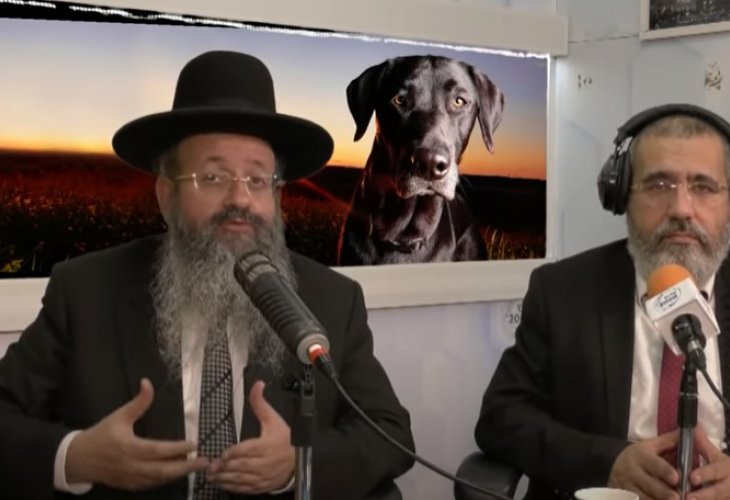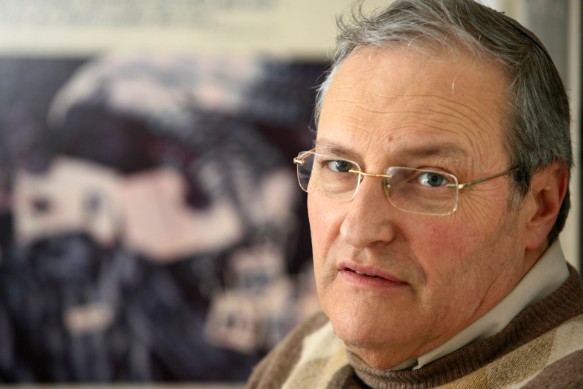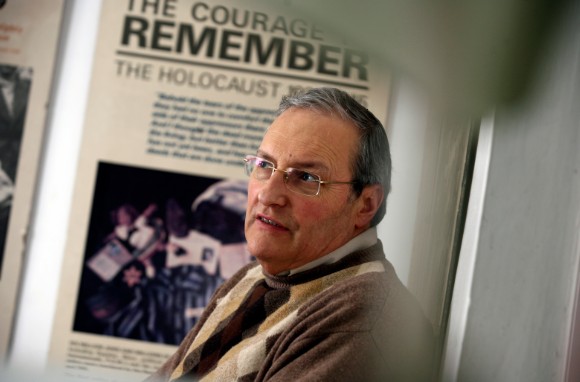The Pursuit of Evil: Interview with the Last Nazi Hunter
As Holocaust Remembrance Day was recently observed, some individuals live each day in an endless battle against brutal criminals, may their memory be erased. One prominent figure is Dr. Efraim Zuroff of the Wiesenthal Center in Jerusalem, 'The Last Nazi Hunter,' who shares in a fascinating interview the arduous journey filled with disappointments and challenges in an attempt to bring as many criminals as possible to justice.
- נ. דוד / יום ליום
- פורסם ב' סיון התשע"ה

#VALUE!
![Dr. Efraim Zuroff (Photo: Yossi Zamir / Flash 90)]() Dr. Efraim Zuroff (Photo: Yossi Zamir / Flash 90)
Dr. Efraim Zuroff (Photo: Yossi Zamir / Flash 90)![Dr. Efraim Zuroff (Photo: Yossi Zamir / Flash 90)]() Dr. Efraim Zuroff (Photo: Yossi Zamir / Flash 90)
Dr. Efraim Zuroff (Photo: Yossi Zamir / Flash 90)
Each year, various Holocaust-related organizations publish comprehensive reports on antisemitism and the extent of legal battles countries are waging against Nazi criminals residing within their territories. Recently, it was announced that researchers from Germany's central office for investigating Nazi crimes intend to expand investigations to find former guards at Auschwitz, including those who worked at other extermination camps, according to a statement to AFP.
Criminals from Several Camps
Simultaneously, the German newspaper WAZ reported that German investigators have identified fifty individuals over the age of 90 who served as guards at Auschwitz, the largest extermination camp and were involved in the murder of Jews. "We are also looking for individuals who served at other extermination camps," stated Kurt Schrimm, head of the German office for investigating Nazi crimes based in Ludwigsburg, southwest Germany. Schrimm explained that it is thought unlikely more guards than the already identified fifty will be found at Auschwitz-Birkenau. Schrimm stressed the need to first verify which of these individuals can still be legally investigated due to prior sentencing, which would exempt them from new trials.
 Dr. Efraim Zuroff (Photo: Yossi Zamir / Flash 90)
Dr. Efraim Zuroff (Photo: Yossi Zamir / Flash 90)The office's head explained that currently, the investigation focuses on "determining who did what and when. For now, we can only ascertain their names, addresses, and birthdates." The central office for investigating Nazi crimes, founded in 1958 and funded by Germany's 16 states (as a federation), has conducted 7,485 investigations against Nazi regime criminal suspects over the years. The range for pursuing Nazi war criminals greatly expanded since a legal precedent set in Germany in 2011, allowing the prosecution of a broader range of suspects. In that year, John Demjanjuk, a former guard at the Sobibor extermination camp, was convicted for the murder of 20,000 Jews and sentenced to five years in prison. The court in this instance deemed all activity within an extermination camp equivalent to murder, convicting him on these grounds.
Germany – A Leading Combatant
Germany is among the nations actively cooperating and striving to prosecute Nazi criminals, holding central responsibility for the Holocaust and its horrific consequences. Germany endeavors as much as possible to mitigate its burden of guilt, striving to vigorously combat Nazi criminals residing within its borders or aiding in their prosecution through available evidence. In stark contrast, Lithuania serves as an example of a country with a completely different policy. Occasionally, the Simon Wiesenthal Center publishes comprehensive reports naming countries striving vigorously in this field and those on a 'blacklist' for insufficient action, at best, to prosecute Nazi criminals within their borders.
In general, enforcement in this area suffers due to problematic evidence foundations and lack of sufficient will. Despite insufficient enforcement, over the years, several Nazi war criminals have been captured and tried. The Simon Wiesenthal Center, alongside its dedicated efforts to capture and prosecute Nazi criminals, regularly compiles these comprehensive reports reflecting conviction rates of Nazi criminals. At the start of 2013, the center published an annual report for the period from April 2011 to March 2012. It revealed that ten Nazi war criminals were convicted worldwide in this timeframe, compared to just two the previous year. The Simon Wiesenthal Center's data tracks global handling of Nazi criminals residing in various countries. Dr. Efraim Zuroff, a Nazi hunter at the center, worked tirelessly on compiling this report repeatedly, as he does with each report.
The 'Last Nazi Hunter'
For Dr. Efraim Zuroff, these reports are not just official documents; they are his life's fight, the essence of his spirit. He chose to combat the vile roots of antisemitism. Dr. Efraim Zuroff, director of the Wiesenthal Center in Jerusalem, has chased ruthless Nazi criminals involved in the most horrible act of murder and responsible for countless deaths, especially among Jews, for decades. He never planned to engage in this profession, eventually earning him the title "The Last Nazi Hunter," but was drawn into it and hasn't let go since. Antisemitism isn't just dry statistics for him; it's about the most despicable criminals in human history, some still alive today, who he seeks to bring to justice for their atrocities. In a special interview, he tells us about the exhausting journey to capture as many still-living Nazi criminals as possible.
Dr. Zuroff, what drew you to pursue Nazi criminals?
"It's a long story. Essentially, there are two answers. On a practical level, it was a time and place coinciding with the right educational background. Over the years, it became a life mission. Jewish history has always intrigued me. During my academic studies at YU, I was active on campus and had questions about the United States' efforts to save European Jews at the time. I addressed these questions in my studies and chose to specialize in Holocaust studies. Later, I worked at 'Yad Vashem' and deepened my research on the subject, standing on the brink of doctoral studies, writing about American Jewry. At this point, I was offered to head academic management at the Wiesenthal Center in Los Angeles."
What did you focus on during your work at the Los Angeles center?
"In Los Angeles, I met Simon Wiesenthal, the famous Holocaust survivor known as the 'Nazi hunter,' devoted to gathering information on Nazi criminals to bring them to justice. Although I had met him before, during my work at the Wiesenthal Center, I got to know him personally. At the time, the issue of Nazi criminals arriving in America surfaced. I moved back to Israel, working from there with the U.S. Department of Justice to locate Nazi criminals and prosecute them. In the sixth year of my work there, I discovered, during a complicated investigation into Mengele, that it is systematically possible to identify Nazi criminals using rescue certificates from 'Yad Vashem.'"
Did American authorities cooperate with this new method?
"The issue was that Americans naturally were interested only in Nazi criminals who landed on U.S. soil, but there were numerous criminals, and I wanted to track as many as possible. I suggested to a senior at the Wiesenthal Center to establish a special office in Israel, trying to convince other countries like Canada, Australia, and New Zealand to prosecute the criminals identified. We initiated it. Without these growing efforts consuming my time, I could have been a professor today instead of a 'Nazi hunter.'"
Why, then, did you continue with it so passionately?
"Here comes the mystical, ideological answer. I am named after one of my mother's uncles who was murdered in the Holocaust. My parents originally planned a different name for me, but my father sent a telegram to my grandfather stating, 'Esther had a son.' Esther, my mother, was his daughter. In response, my grandfather suggested the name Efraim, in memory of the murdered family member, a student of Rabbi Chaim Ozer who fled east Poland and was killed. Being named after one of our family's Holocaust martyrs urged me in this Sisyphean task of capturing Nazi criminals. Ironically, my uncle was killed by Lithuanians; I mainly pursue German and Austrian criminals."
Intensive Detective Work
How is the identification and exposure of criminals conducted?
"One can say the work is a third detective, a third historian, and a third political lobbyist. You need to physically find the criminals, submit documents and witnesses for prosecution, and often, or rather most of the time, act politically to bring prosecuted criminals to justice. Given the long time since the crimes took place, work defies logic. Police investigating a current crime examine the act itself. In these cases, most responsible are no longer living. It's necessary to locate the perpetrators of the crime themselves."
To whom are the exposed criminals handed over?
"To the authorities of the country where the criminal resides. Concerning prosecution, the preference is to do it in the country where the crimes were committed, or alternatively, the country that sanctioned the crime. For instance, a German committing the crime in Lithuania can be prosecuted by both Lithuania and Germany. In the United States, a Nazi criminal cannot be prosecuted as the crime was not committed within the country's borders or against U.S. citizens. However, Americans can revoke citizenship from Nazi criminals and deport them."
How many criminals have you identified?
"I uncovered escape routes of over 3,000 criminals, starting in 1986. By that time, many were already deceased, and among the thousands identified, perhaps only 2% were prosecuted."
 Dr. Efraim Zuroff (Photo: Yossi Zamir / Flash 90)
Dr. Efraim Zuroff (Photo: Yossi Zamir / Flash 90)Which countries cooperate with these efforts?
"Countries actively tracing Nazi war criminals are mainly the United States, Germany, and Italy, although there they usually involve deportation and not necessarily Holocaust criminals. Serbia also attempts to act in this realm. In other places, efforts are non-existent, like in Lithuania, Latvia, and Estonia, or very minimal like in Hungary and Croatia."
How many Nazi criminals are alive today?
"No one knows. My definition of a Nazi is anyone collaborating or assisting the Third Reich in persecuting or murdering innocent civilians. We have no way of knowing how many such criminals are still alive and moving around the world."
In recent years, a Nazi criminal in Hungary was only revealed after being photographed and documented by a British newspaper. Why is there such slow or no action against criminals, and why are punishments so mild?
"I located the Hungarian criminal, named Csätly, nearly two years earlier. Only through collaboration with the British newspaper was it publicized. The reality is that only after Csätly was exposed in the media was an indictment filed against him. Global nations generally hesitate to prosecute criminals. If a criminal is committing current serial offenses, efforts will naturally be made to capture and prosecute them. What are the chances a Nazi will murder again? Zero. Thus, they are not seen as a risk by authorities. Consequently, motivation to capture them is lacking. What we try to do is persuade legal authorities everywhere that a Nazi criminal free in their country is a 'moral contaminant,' a 'health' issue for the country."
With this being the state of affairs, what keeps you motivated in your identification and capture efforts?
"About three years ago, I exposed a criminal in Hungary named Sandor Kepiro, responsible for the mass murder of thousands of people in Novi Sad, Serbia, and its surroundings, including Serbs, Jews, and Roma. Kepiro was part of a group of officers carrying out the murder. He stood trial and was acquitted, a shocking decision. I was devastated, having spent five years on his identification and gathering undeniable evidence of his crimes, confidently expecting a conviction. This is not the first time this happened to me. What fuels my perseverance is thinking about the victims. The frustration, disappointment, and anger are nothing compared to the Holocaust victims. It may sound presumptuous, but I feel like a kind of emissary. I think of the murdered, may their memory be blessed, and try doing all I can to locate as many criminals as possible, aiming to bring them to justice for their heinous deeds."
Are there any specific Nazi criminals currently targeted? Are there names of those currently pursued or attempts to trace these days?
"We have a list of ten wanted, without current developments. About a year and a half ago, we created a new list after several criminals died. Recently, following the 'Last Chance Operation' we launched in Germany, we managed to track a criminal, a former guard at Dachau camp. We've disclosed his name to German authorities, and it is now under investigation in Berlin. Beyond that, as I mentioned, there are no special updates, but we hope and tirelessly act to continue advancing our efforts."

